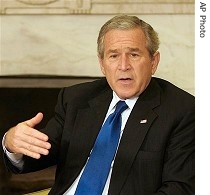-
(单词翻译:双击或拖选)
By Paula Wolfson
Washington
31 October 2006
 President Bush |
||
-----
Roughly three weeks after it staged its first nuclear test, North Korea agreed to return to negotiations.
The surprise announcement was made in Beijing, where envoys2 from North Korea, China and the United States had been holding unpublicized talks. In Washington, President Bush hailed the news. "I'm pleased, and I want to thank the Chinese for encouraging the meeting that got the agreement to get the six-party talks restarted," he said.
Mr. Bush acknowledged the path ahead will not be easy, and stressed there is plenty of work to do. But he left no doubt he considers the announcement to resume the six-party talks to be a major development. "I've always felt like it is important for the United States to be at the table with other partners when it comes time to addressing this important issue," he said.
During a brief session with reporters, Mr. Bush made no mention of concessions3 to North Korea, such as a possible roll-back of sanctions imposed after Pyongyang's October 9 nuclear test. Instead, he emphasized he will take steps to ensure the North Koreans live up to their international obligations.
"We'll be sending teams to the region to work with our partners to make sure that the current United Nations Security Council resolution is enforced, but also to make sure that the talks are effective; that we achieve the results we want, which is a North Korea that abandons their nuclear weapons programs, and her nuclear weapons, in a verifiable fashion inn return for a better way forward for her people," he said.
South Korea and Russia joined the United States and China in cheering the unexpected news of a resumption of the six-party talks with North Korea. But the response from the other participant in the talks, Japan, was somewhat muted.
While welcoming the outlook for a new round of negotiations, Japanese officials also voiced some skepticism, saying North Korea will not be allowed back to the talks if it still possesses nuclear weapons.
When asked about the statements from Tokyo, White House spokesman Tony Snow said all the participants to the six-party talks backed the agreement to resume negotiations. Snow said the diplomatic breakthrough shows that the president's multilateral approach to the North Korean problem is working. "What you got here with the North Koreans agreeing to return to the six-party talks is a vindication4 of the strategy the president has adopted. You notice who made the announcement: the Chinese," he said.
Snow said the agreement shows the only way to get results is through a multilateral effort, adding it is essential to bring in those who have the most leverage5 and influence over the North Koreans and their behavior.
 收听单词发音
收听单词发音
1
negotiations

|
|
| 协商( negotiation的名词复数 ); 谈判; 完成(难事); 通过 | |
参考例句: |
|
|
|
2
envoys

|
|
| 使节( envoy的名词复数 ); 公使; 谈判代表; 使节身份 | |
参考例句: |
|
|
|
3
concessions

|
|
| n.(尤指由政府或雇主给予的)特许权( concession的名词复数 );承认;减价;(在某地的)特许经营权 | |
参考例句: |
|
|
|
4
vindication

|
|
| n.洗冤,证实 | |
参考例句: |
|
|
|
5
leverage

|
|
| n.力量,影响;杠杆作用,杠杆的力量 | |
参考例句: |
|
|
|















